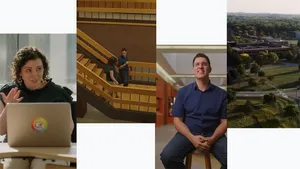Meet the Ph.D. students changing the face of computing

Every day, computer science researchers are working to solve big problems that impact all of our lives — from expanding accessibility in wearable technology to improving the lives of rural farmers through AI. For CS research to explore issues that impact all communities, it’s crucial that the researchers themselves are representative of those communities. However, in 2020, less than 10% of computer science Ph.D. degrees in the United States were awarded to researchers from historically marginalized groups in computing.
As part of our efforts to make CS research careers more accessible, Google Research is continuing our work with the Computing Alliance of Hispanic Serving Institutions (CAHSI) and the CMD-IT Diversifying LEAdership in the Professoriate (LEAP) Alliance to increase the diversity of Ph.D. graduates in computing. Together, we are providing dissertation awards to support Doctoral students from historically marginalized groups as they complete their Ph.D. requirements. This year, we have six winners: Abel Gomez Rivera, Dhruv Jain, Elsa Tai Ramirez, Matthew Anderson, Rodrigo Augusto Silva Dos Santos, and Saadia Gabriel.
We spoke with two of our 2020 award recipients — Amber Solomon from The Georgia Institute of Technology (Ph.D. ‘21) and Oscar S. Veliz from The University of Texas at El Paso (Ph.D. ‘21) — about their computing research journeys and aspirations for the future.
What inspired your interest in computer science research?
Amber: Computer science has reached a critical point in its evolution. Artificial intelligence and machine learning have made major leaps from ideas in a lab to tools in the palm of people’s hands. This increases the urgency to understand its benefits and potential negative effects. Few disciplines have this level of impact on society. For that reason, it's super important that we have different perspectives in this space.
Oscar: I took a course on Multi-Agent Systems and Game Theory with a professor who later became my advisor. The subject was fascinating, and I dove head first into the latest, cutting-edge research. I felt that this was an area of Artificial Intelligence that had so many possibilities and unanswered questions that I had to get involved.
What were some defining moments in your computer science journey?
Amber: During the second year of my Ph.D. program, I taught introductory programming and human-computer interaction at a private, alternative high school. Students designed and programmed technology to address issues they cared about, including gentrification, racism, and police brutality. They had so many interesting and important things to say. It pushed me to reflect on the impact computer science has on the individual and society, and my role as a researcher.
Oscar: Going to conferences and talking shop with the authors of papers I had read helped put a real person behind the research. Attending research discussions and mentorship panels with senior researchers who looked like me, and shared their similar struggles with me, also struck a chord. I learned that it wasn’t uncommon to feel like an impostor and that I could, and should, seek help.
How has the Google dissertation award impacted your research career path?
Amber: Research from racially and ethnically minoritized researchers often gets ignored or isn’t considered as legitimate as others. So, to win the Google-LEAP Dissertation Award was incredibly validating. It made me feel like my voice mattered and was legitimate.
Oscar: I am quite terrible at giving myself credit. I wouldn’t apply to certain jobs because I believed that I wasn’t good enough. All it took was a mentor who believed in me. After the recognition from Google-CAHSI, I started to build up my confidence and apply to prestigious places. Now, I am a Postdoctoral Fellow at Carnegie Mellon University.
What are some experiences and/or accomplishments you are most proud of?
Amber: I am the first person in my family to get a Ph.D. It wasn't easy because my family had never been through the process, so they could not understand what I was going through. I'm also proud of how I conducted my dissertation research, which was not typical in my field. I try to learn with and from as many people as possible, including academics, TikTokers, grandmothers, friends, etc. I try to be as willing and open as possible to different perspectives. That made me more open to different methodologies and theoretical frameworks.
Oscar: I was fortunate to do research on AI applications in teaching and learning with college students using a variation on poker. I had just as much fun creating the lesson as I did performing the research. While pursuing my Ph.D., I also became a course instructor and lectured 80-person classes. I was really proud to watch my students master topics that I was teaching. I’m also proud of creating numerical analysis lessons on my YouTube channel.
What advice do you have for others starting their journeys to becoming computer science researchers?
Amber: Remember that your ideas are valid and important. You deserve to take up space.
Oscar: Develop a community of support — whether it’s family, other faculty, or fellow Ph.D. students. You can’t do a Ph.D. alone, no matter what anyone tells you. It is also OK to ask for help, even professional help. It isn’t a sign of weakness, but an indication of self-awareness, with the ability to recognize that change is necessary. That is the hard part.
Read more about our 2021 winners and their dreams for the future below.
Dhruv Jain, University of Washington (left): I will pursue a research position in an academic or industry research lab to advance "sound accessibility." With my new position, I also hope to increase participation of people from underrepresented backgrounds, especially those with disabilities.
Abel Gomez Rivera, The University of Texas at El Paso (right): Working as a scientific researcher has been my dream since I had my first research-oriented class. Applying my aptitude for research and my passion for educating future generations in an academic setting is my ideal working environment.
Elsa Tai Ramirez, The University of Texas at El Paso (left): My aspiration is to apply for a faculty position in a software engineering or computer science department. As a faculty member, I would like to continue teaching software engineering and doing research in software requirements and software architecture.
Matthew Anderson, University of California, Berkeley (right): I view technology, engineering and computing as our way of bending the arc of history, as a tool for making our lives more beautiful in any number of ways. My dream is to change the world with the technology I work on and to see all my not-so-silly childhood ideas of a science-filled future realized ... or to at least have fun working on exciting tech along the way.
Rodrigo Augusto Silva Dos Santos, The University of Texas at Arlington (left): I look forward to connecting academia and industry through joint research and development projects. This would benefit software engineering and computer science students who join these projects as researchers, allowing them to get much-needed practical experience.
Saadia Gabriel, University of Washington (right): I am passionate about socially-motivated machine learning (ML), such as algorithmic fairness. I believe that awareness of social issues leads to more responsible and better-designed ML systems. I plan to use my role as a researcher to mentor Natural Language Processing and ML students working on challenging, real-world problems.







